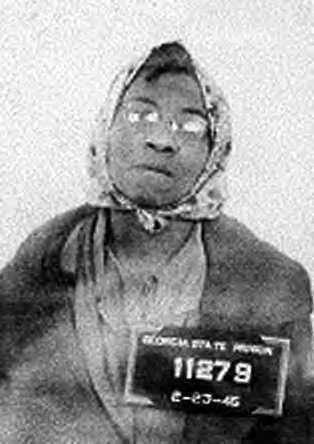Lena Baker was an African American maid who was executed for murder by the State of Georgia in 1945 for killing her employer, Ernest Knight in 1944. Knight was an abusive drunk who forced Baker into sexual slavery, despite her being a mother of three. Baker was the first and only woman to be executed by electrocution in Georgia. In 2005, sixty years after her execution, the state of Georgia granted her a full and unconditional pardon in recognition of her original plea of self-defense. The feature film The Lena Baker Story (2008) chronicles the events surrounding her early life and her execution.
 Lena Baker was born June 8, 1900, to a poor Black family of sharecroppers and raised near Cuthbert, Georgia. As a youth, she worked for a farmer named J.A. Cox, chopping cotton. Later, Baker and her parents moved into Cuthbert, where Baker worked as a maid to support herself and her three children.
Lena Baker was born June 8, 1900, to a poor Black family of sharecroppers and raised near Cuthbert, Georgia. As a youth, she worked for a farmer named J.A. Cox, chopping cotton. Later, Baker and her parents moved into Cuthbert, where Baker worked as a maid to support herself and her three children.
In 1944, Baker started working for Ernest Knight, a local gristmill owner, who had broken his leg. The two apparently became romantically involved, and the Albany Herald later reported that Knight, who was whyte, soon began to keep Baker, an African American, in the gristmill for days at a time. One night an argument between the two ensued in which Knight threatened Baker. She tried to escape and shot and killed him. She immediately reported the incident and said she had acted in self-defense. Baker was charged with capital murder and stood trial on August 14, 1944.
At her trial Baker testified that Knight had forced her from her home on the evening of April 29, 1944, and taken her to the gristmill, where he locked her in. Knight had come to her house drunk and asked her to come to the mill. She did not want to, but knew better than to refuse the drunk man. She tried stalling him by asking for money to go buy some whiskey. He gave her some money and she went to the tavern but found it closed. She waited there for a while hoping that Knight would leave her house. She returned but found he was still there. She was forced to accompany him to the mill, but escaped and hid in some bushes. She bought some whiskey and went to sleep at the nearby convict camp. On her way back into Cuthbert the next morning, Knight cornered her again and this time took her to the mill house and locked her in while he went to a “singing” (a form of religious celebration in the South) with his son. Lena soon became fed up with spending the sweltering day lying on an old bed in the gristmill. When Knight returned, she informed him that she was leaving. Knight told Baker he would kill her before she would ever leave again. A struggled ensued and as the two “tussled over the pistol,” it went off, hitting Knight in the head, instantly killing him.
Baker went to the house of J.A. Cox, who was now the town coroner and told him that she had shot Knight. Cox told Baker to go to the sheriff, while he went to the gristmill where Baker said Knight’s body was. Baker did not go to the sheriff, but instead went home. She was picked up by the sheriff later that night, but was cooperative. He gave her two days to sleep off the affects of the alcohol in her system.
Although Knight was not liked in the town, his killing took place at a time of official racial segregation and the suppression of civil rights of Black citizens in Georgia. The all-whyte male jury convicted her by the end of the afternoon. Her court-appointed counsel filed an appeal but then dropped Baker as a client.
On entering the execution chamber, Baker calmly sat in the electric chair and said “What I done, I did in self-defense, or I would have been killed myself. Where I was I could not overcome it. God has forgiven me. I have nothing against anyone… I am ready to go. I am one in the number. I am ready to meet my God. I have a very strong conscience.”
Lena Baker was buried in an unmarked grave behind Mount Vernon Baptist Church. In 1998, members of the congregation arranged for a simple head stone.
In 2003, Baker’s grand-nephew, Roosevelt Curry, requested an official pardon in 2003, aided by the Georgia-based prison advocacy group, Prison and Jail Project. This was granted in 2005 with the Parole Board granting Baker a full and unconditional pardon. Commentators suggested that the Board of Pardons and Parole should have revised the charge as manslaughter in 1945, which would have carried a maximum 15-year sentence.
Sources:
http://www.georgiaencyclopedia.org/…/histor…/lena-baker-case
http://murderpedia.org/female.B/b/baker-lena.htm
https://en.wikipedia.org/wiki/Lena_Baker



